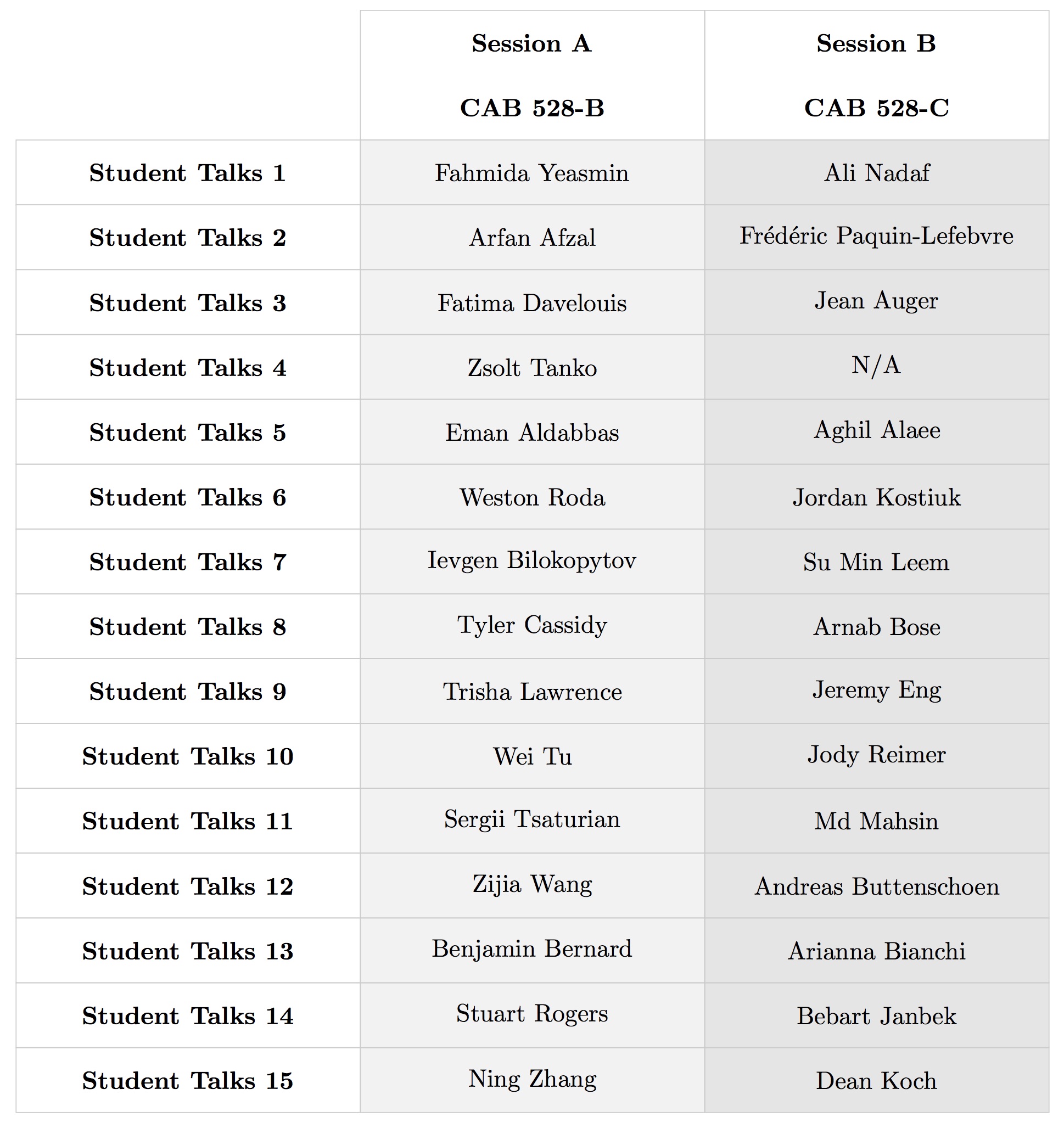Talks & Schedule
The programme of the 2016 edition of the conference follows.
ROOM CHANGE:
J.Rosenthal's lecture @ 1 PM on Tuesday June 14th is moved to CCIS L2-190
Here is the full programme of the conference.
You can also download the networking workshop slides.
The schedule is available just below on this page.
It is a pleasure to confirm the presence of our plenary speakers:
- Thomas Creutzig (University of Alberta)
- Brian Forrest (University of Waterloo)
- Yuan Lou (Ohio State University)
- Vakhtang Putkaradze (University of Alberta)
- Jeffrey Rosenthal (University of Toronto)
The keynote speakers' abstracts can be found below.
Next is the schedule of the conference. You will find information about the workshops & the panel discussion at the bottom of this page. You can also download the schedule in PDF format.

All plenary lectures will be given in CCIS 1-140
A Modular Story
Thomas Creutzig
University of Alberta
Time : 5:00 PM on Tuesday (June 14th)
Location : CCIS 1-140
Modular functions are functions on the upper half of the complex plane that are invariant with respect to an action of a certain discrete group, the modular group. These objects appear all over many interesting areas of pure mathematics and quantum physics. A famous example is the monster moonshine, relating modular functions and physics to the largest simple sporadic group, the monster. But this is only one instance of a connection between modular forms, physics and representation theory and I plan to give an overview on this topic.
Banach Algebras Arising in Abstract Harmonic Analysis
Brian Forrest
University of Waterloo
Time : 1:00 PM on Wednesday (June 15th)
Location : CCIS 1-140
In abstract harmonic analysis one of our key goals is to study the structure of a locally compact group G via the various Banach algebras that arise from the group. In this talk I will give a brief introduction to some of the core players in this story, namely the group algebra, the Fourier algebra and the Fourier-Stieltjes algebras. I will also present some structural properties of groups that can be readily deduced from these algebras. Specifically, we will focus on discreteness, compactness and amenability for G.
Three Small Stories in Spatial Ecology
Yuan Lou
Ohio State University
Time : 1:00 PM on Monday (June 13th)
Location : CCIS 1-140
How can organisms persist in rivers without being washed out? Why does the distribution of some species suddenly change while the environmental conditions changes gradually? How does the movement of organisms evolve? I will use some differential equation models to address these questions.
Dynamics and Control of Flexible Solar Towers
Vakhtang Putkaradze
University of Alberta
Time : 1:00 PM on Thursday (June 16th)
Location : CCIS 1-140
The use of solar chimneys for energy production has been suggested more than 100 years ago. Unfortunately, this technology has not been realized on a commercial scale, in large part due to the high cost of erecting tall towers using traditional methods of construction. Recent works have suggested a radical decrease in tower cost by using an inflatable self-supported tower consisting of stacked toroidal bladders. While the statics deflections of such towers under constant wind have been investigated before, the key for further development of this technology lies in the analysis of dynamics, which is the main point of this talk. Using Lagrangian reduction by symmetry, we develop a fully three dimensional theory of motion for such towers and study the tower's stability and dynamics. Next, we derive a geometric theory of optimal control for the tower dynamics using variable pressure inside the bladders, and perform detailed analytical and numerical studies of the control in two dimensions. Finally, we report on the results of experiments demonstrating the remarkable stability of the tower in real-life conditions, showing good agreement with theoretical results. This work has been supported by NSERC and the University of Alberta.
The Mathematics of MCMC
Jeffrey Rosenthal
University of Toronto
Time : 1:00 PM on Tuesday (June 14th)
Location : CCIS L2-190
Markov chain Monte Carlo (MCMC) algorithms, such as the Metropolis Algorithm and the Gibbs Sampler, are extremely useful and popular for approximately sampling from complicated probability distributions by using repeated randomness. They are frequently applied to such diverse areas as Bayesian statistics, physical chemistry, medical research, financial modeling, numerical integration, and more. Using simple graphical simulations, and analogies to casino gambling and public opinion polls, this talk will explain how these algorithms work, why they are useful, and how mathematical analysis can provide deeper insights into their workings. We will also discuss the mathematical challenges of ``adaptive'' MCMC, which modifies the algorithm while it runs in an effort to improve its performance on the fly.
We continue the tradition of offering interactive workshops aimed at developping or improving professional skills that are relevant to young mathematicians and statisticians. Tuesday's workshop will focus on the increasingly important skill of networking: how to approach people, how to follow up professionally after an encounter and how to keep a business relationship active. On Thursday, the focus will be turned to academic writing practices: we will offer two parallel sessions (one with a pure math focus, one with an applied math focus) that give advice on writing practices: research papers, grant proposals, scholarship applications and responses to referees.
The overarching theme of these workshops is to enhance skills that are useful regardless of whether or not we stay in academia. Networking is equally helpful within and outside of academia, and many jobs in industry involve writing reports and proposals that are being judged by some committee just as much as in academia. Staying within this theme, our panel discussion on Wednesday is entitled "Academia vs. Industry — which way to go?", and it will be a heated discussion between our professors and former graduates from our department. Since we have not finalized our panelists yet, the topic of the panel discussion may be subject to change.
